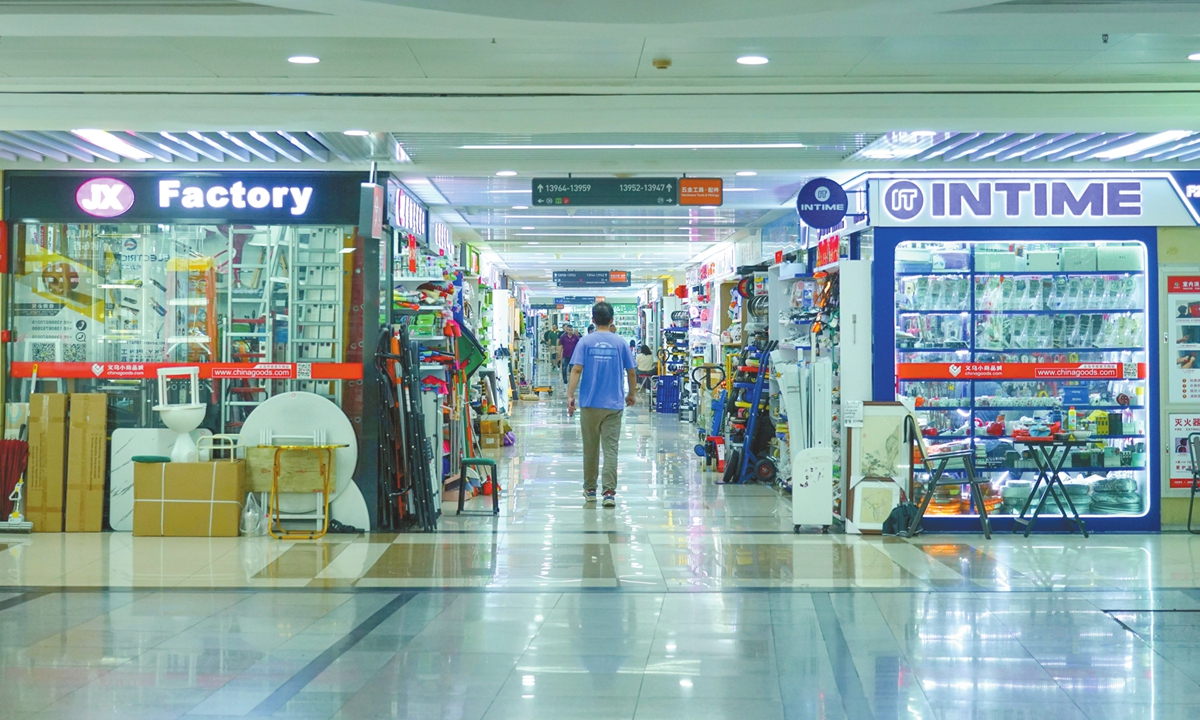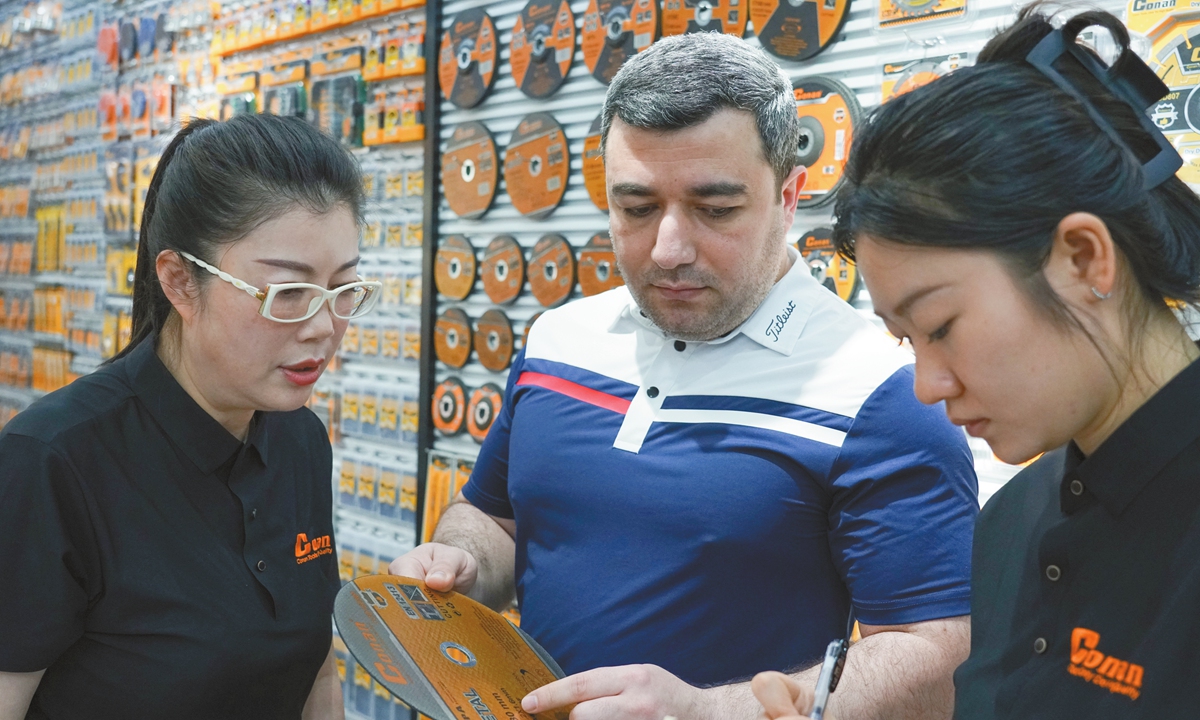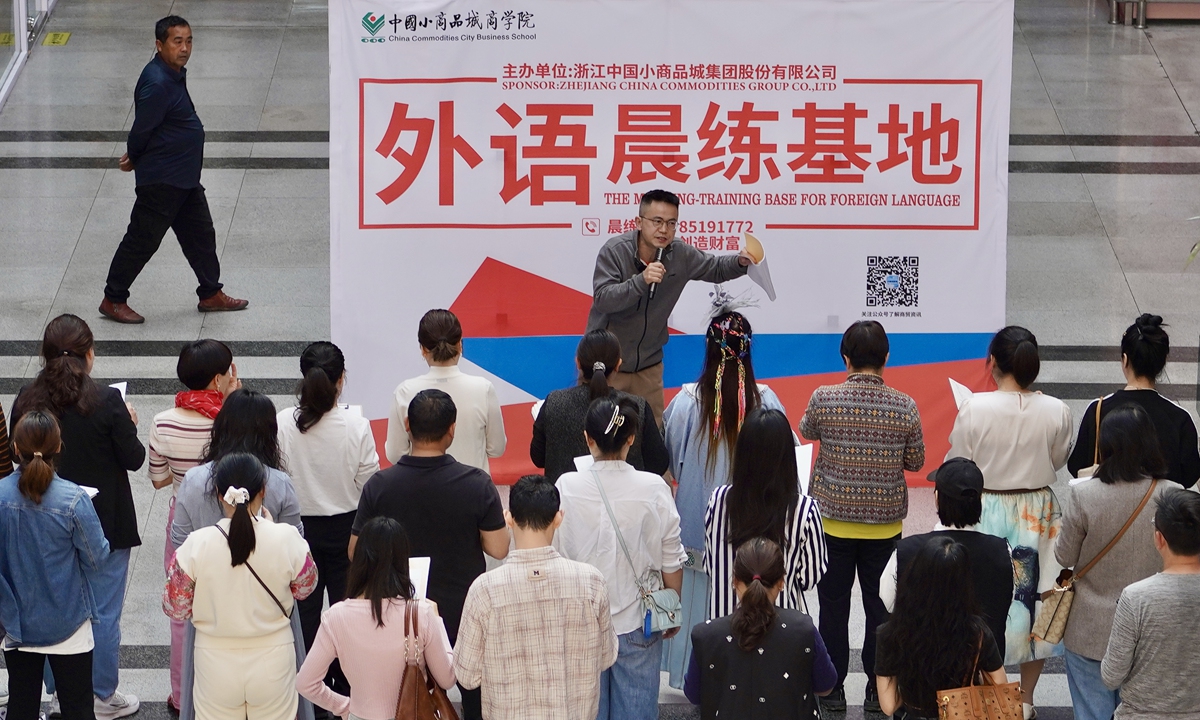
A corridor in the hardware section of the Yiwu International Trade City, on April 11, 2025 Photo: Feng Fan/GT
"We just got a 10-million-yuan ($1.37 million) order put on hold by US clients due to tariff concerns," said Wu, a manager at a hardware store in Yiwu, China's export hub, located in East China's Zhejiang Province.
Far from being overwhelmed with anxiety, Wu, gesturing toward a metal tools display, was the picture of serenity. "Honestly, I'm not even worried," said the longtime merchant.
Shortly after the US announced sweeping tariffs against its trading partners and singled out China for even higher duties, many have turned their eyes to Yiwu, known around the world as the global capital of small commodities for signs of impact. But sitting in his well-kept shop, Wu, a veteran hardware merchant whose clients include those from the US, appeared unfazed.
"US tariffs will certainly affect international trade. In previous years, my shop would be packed wall-to-wall with people at this time, around the Canton Fair," Wu revealed. "But now, I can sit down and enjoy a cup of tea with you."
Despite this, Wu appears unperturbed, "Honestly speaking, this particular order is insignificant for my business," as sales to the US market account for less than 7 percent of Wu's company's annual revenue.
Wu moved from Beijing after the 2008 Olympic Games to Yiwu, after seeing an opportunity to start his own export business, encouraged by China's continued opening-up. From hammers to lawnmowers, his product range has already made inroads into the US market, supplying large retailers such as Home Depot and Costco.
Inside his combined office and storefront at the Yiwu International Trade City, the setting is orderly. While the US continues to wield tariffs that have rattled global supply chains and sown uncertainty among businesses - making US companies wary of placing new orders, Global Times reporters observed that many merchants and buyers from around the world still flock to Yiwu, fueling brisk daily transactions.
Wu's attitude encapsulates the sentiment of many merchants in Yiwu who are feeling the ripple effects of US tariffs on global trade. For many local companies, the US market is their important export destination. Orders have been put on hold, and American clients are adopting a wait-and-see approach. Yet, the calm demeanor of the trade city's businesspeople and the continuous flow of new orders hardly suggest that this export-centric city is caught up in a swirl of tariffs and a potential round of a new trade war.
A diverse export portfolio

An Azerbaijani trader selects products at a wholesale hardware store in Yiwu, East China's Zhejiang Province, on April 11, 2025. Photo: Feng Fan/GT
Yiwu's vivid diversity becomes immediately apparent once you walk down the main streets of the city. Signs are printed not just in Chinese, but also in Arabic, Spanish, Portuguese, and Cyrillic among others. Restaurants serving Turkish, Ethiopian, Brazilian, and Argentine cuisine pack the streets.
Yiwu is a cosmopolitan hub. According to official data, its permanent population stood at around 1.9 million at the end of 2023, of which more than 300,000 were foreign nationals, among whom more than 21,000 were long-term residents engaged in business.
Yiwu trades with almost every country in the world, with particularly fast growth among Belt and Road Initiative (BRI) partner countries in Africa, the Middle East, and Latin America, according to Wu.
"For people in these regions, the fastest route to start a business is to come to Yiwu. Our products are high-quality, diverse, and easily customizable," Wu said. "If tariffs slow down our US sales, higher demand from other markets could quickly offset any loss."
Data from Yiwu Customs showed that in 2024, the city's total imports and exports reached 668.93 billion yuan, up 18.2 percent year-on-year. Of that figure, trade with African nations totaled 122.09 billion yuan, up 16.4 percent, and with Latin America the figure stood at 111.67 billion yuan, up 24.4 percent. The city's trade with Saudi Arabia also rose 16.5 percent to 16.46 billion yuan.
While interviewing Yiwu-based merchants, Global Times reporters observed a prevailing sense of optimism. Rather than feeling weighed down by the burden of tariffs, most business owners - even those directly hit by canceled orders - expressed confidence.
"We had a US client who recently paused a shipment worth several hundred thousand yuan because of tariffs," Wang Nan, a hardware merchant who has operated in Yiwu for more than 20 years, told the Global Times.
"But that doesn't bother me a lot. Although tariffs did cut the ongoing orders with our US partners, our overall sales remain steady," Wang said. "In the coming months, we will attend trade fairs in Kenya, Saudi Arabia, and Southeast Asia, to explore new growth opportunities," she added.
Just as Wang was speaking with the Global Times, two foreign traders walked into her shop. Wang introduced them to Global Times reporters as longtime clients from Azerbaijan. After briefly inspecting a few product samples, they swiftly decided to place additional orders for grinding wheels and electric screwdrivers.
"We don't put all our eggs in one basket; we export to every corner of the globe. If Americans stop buying, we'll simply sell to others. That's the source of our confidence," Wang told the Global Times. "After all, hardware tools are household essentials, whether in developed nations or emerging markets, people will always need them."
Comprehensive, yet flexible supply chain"If you see a character in a movie that premiered yesterday, you can have that toy produced today - only in Yiwu," Wu said. In his view, it is precisely because of Yiwu's speedy and flexible production capacity that small businesses from around the globe are drawn there, and these smaller enterprises serve as Yiwu's key shield against the threat of US tariffs.
In one of the city's main wholesale centers, the Yiwu International Commodity Trade City - a sprawling network of 75,000 booths showcasing over 2.1 million kinds of goods - seemingly endless shelves are stocked with everything from Easter eggs and Santa hats to drones and smartwatches.
"The US hopes tariffs will force manufacturers to relocate outside of China, but replicating our supply chain is nearly impossible," Shi Mi, owner of Danmi Tools in Yiwu, told the Global Times. "China's supply chains were not built overnight; it took years of competition to make it a world factory that produces almost everything that people need, and in Yiwu, we make sure you can get access to all of them."
A report on the State-owned Assets Supervision and Administration Commission's website highlights that China's industrial capabilities span all 41 major categories, 207 medium categories, and 666 small categories. It is the only country covering every industrial category recognized by the UN.
"In Yiwu, there are so many options that you can find almost everything in one place," Leandro Partata, a Brazilian trader who just bought $215,000 worth of Christmas and festive gifts. He told the Global Times that even with increased shipping costs due to tariff-induced volatility, he will continue to source his merchandise from Yiwu.
At an umbrella shop, a staff member told the Global Times that their products could satisfy almost any customer requirement - from folding umbrellas priced as low as $1 to decorative parasols retailing for $90, and a model featuring a Van Gogh painting inner lining and equipped with a built-in fan.
"Yiwu's success stems from its flexible business model and a speed that's tough to beat - you can find whatever you need in the shortest time possible," said another trader with three decades of foreign trade experience. "That's why I'm not particularly worried about tariffs. The global market is large," the trader added.
Steadfast confidence

Merchants learn practical business Arabic in the Yiwu International Trade City in Zhejiang Province, on April 15, 2025. Photo: IC
The frontloading of exported goods took place amid the US' ratcheting up of tariffs, which shot up to 145 percent in April from 20 percent in the first quarter on Chinese products.
This has dampened the global trade growth outlook, with the WTO warning that the trade row could cut the shipment of goods between the world's two largest economies by as much as 80 percent.
Xiao Lu, an official with the Ministry of Commerce, pointed out that since the beginning of 2025, China's foreign trade sector has faced heightened risks and challenges at a press conference on April 9.
Amid the intensifying tariff tensions between China and the US, some Chinese exporters are beginning to feel the sting more acutely. A freight forwarder told the Global Times that all shipments to the US in his portfolio had been halted, as clients suspended or canceled orders due to escalating costs. Some textile enterprises have slowed down their production lines for exports to the US.
The disruption underscores mounting pressure faced by certain Chinese export-oriented firms. As one of China's major seafood exporters to the US, Baiyang Group, a Shanghai-listed company, announced on Monday that it would suspend new orders from the US and delay the delivery of existing ones. It stated that it will further strengthen sales in the domestic market.
Despite a complex and challenging external environment, General Administration of Customs's spokesperson Lü Daliang said on Monday that "the sky won't fall" for China's exports. In recent years, China has actively pursued market diversification and deepened industrial and supply chain cooperation with partners around the world - a move that not only supports the development of its trading counterparts, but also strengthens the country's own economic resilience, Lü added.
Yiwu merchants, at the front of China's international trade, echoed his sentiment. Most of the businesses say they are "not afraid."
This city, as one of China's most crucial windows for foreign trade, links international markets with domestic manufacturing and mirrors the broader trajectory of the nation's trade. In the first quarter, China's trade with BRI partner countries has also accelerated, with a total trade volume of 5.26 trillion yuan, up 2.2 percent, accounting for 51.1 percent of China's total trade, according to the customs.
China's growing export diversification is widely seen as an effective response to US unilateralism and trade pressure, Cong Yi, a professor at the Tianjin School of Administration, told the Global Times. "The increasing share of exports to the BRI partner countries is a significant trend," he said.
China is also advancing consumption-driven relief efforts. Policies such as tax refunds for foreign tourists and ongoing events like the 137th Canton Fair and the 5th China International Consumer Products Expo are part of a broader strategy to sustain trade momentum amid external headwinds.
Amid global market turbulence, Wu, a seasoned trader who has weathered previous trade rows and tariff hikes, said he wouldn't advise newcomers to enter the industry now, but reiterated his confidence that Yiwu will stay resilient despite US tariffs, with many businesses holding steady.
"When I first arrived in Yiwu, I only had 100 yuan in my pocket. My business developed alongside this city, relying on its unique 'store in the front, factory in the back' model - flexible, fast, and low-cost," Wu said. "Yiwu has gone through some ups and downs, even if US tariffs or a trade war loom, I believe the city will continue to flourish," Wu noted.






